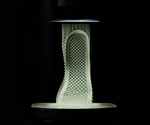Protolabs Will Now Offer the Carbon Platform to Its 3D Printing Services
Greg Thompson, Protolabs' global product manager for 3D printing, discusses why the Carbon technology is a good fit for Protolabs’ customers.
Protolabs has added the Carbon platform to its portfolio of production-grade additive manufacturing technologies. With this addition, the company expands its industrial 3D printing capabilities for production-grade parts with Carbon Digital Light Synthesis technology.
Carbon DLS is frequently used for intricate designs that are challenging to mold and durable 3D-printed components for end-use applications.
Greg Thompson, Protolabs' global product manager for 3D printing, told Plastics Technology that 3D printing has shown tremendous growth in adoption over the past few years. And that today, many of its customers are considering how to take advantage of the design freedom that additive manufacturing offers in their end-use production parts. However, he said that many of the traditional 3D printing technologies have been limited by either costs or the material properties they can achieve.
“We are committed to supporting our customers with both a prototyping and on-demand manufacturing solutions in each of our service lines, and Carbon's offering now adds to our production-capable technologies in 3D-printed plastics,” Thompson says.
Protolabs is offering materials comparable to ABS and polycarbonate, which reportedly have consistent mechanical properties akin to injection molding.
“Carbon’s DLS—especially in the performance materials which include the RPU70 and FPU50 that we are offering —is able to set itself apart with advanced material properties along with a good surface quality,” he says. “This makes Carbon parts closer to injection molding that engineers are used to working with and makes Carbon viable for more applications than we could previously support.”
Protolabs is one of largest suppliers of custom 3D printing services in the world, producing more than 100,000 printed components every month across six different additive manufacturing technologies.
“We see Carbon as a great fit for designers and engineers across a wide range of industries,” Thompson says. “It will be a great choice for parts needing enhanced material properties, especially those with lower quantities or very complex designs that may be challenging in traditional manufacturing methods.”
Related Content
-
Getting into Plastics Additive Manufacturing? Avoid these Six Common Errors
There are a lot of 3D printing technologies out there, and it’s not uncommon for processors new to additive manufacturing to get tripped up. Here are some typical snafus, along with advice on how to avoid them before you start making parts.
-
Production Tool, Prototype Time
Mantle's metal 3D printing technology targeted toolmaking and injection molders and moldmakers are taking notice.
-
420 Stainless Steel Now Qualified With TrueShape 3D Printing Technology
NPE2024: Mantle's additive manufacturing technology is designed for precision tooling.















